Hello and welcome to Episode 19 of the What China Wants podcast.
With false reports of a coup against Xi Jinping ringing around the newspapers last weekend, we look at who could have been responsible for this disinformation - and dig into how China uses disinformation for its own purposes too. We interview friend of the show Alex Neill, a leading expert on Chinese influence abroad.
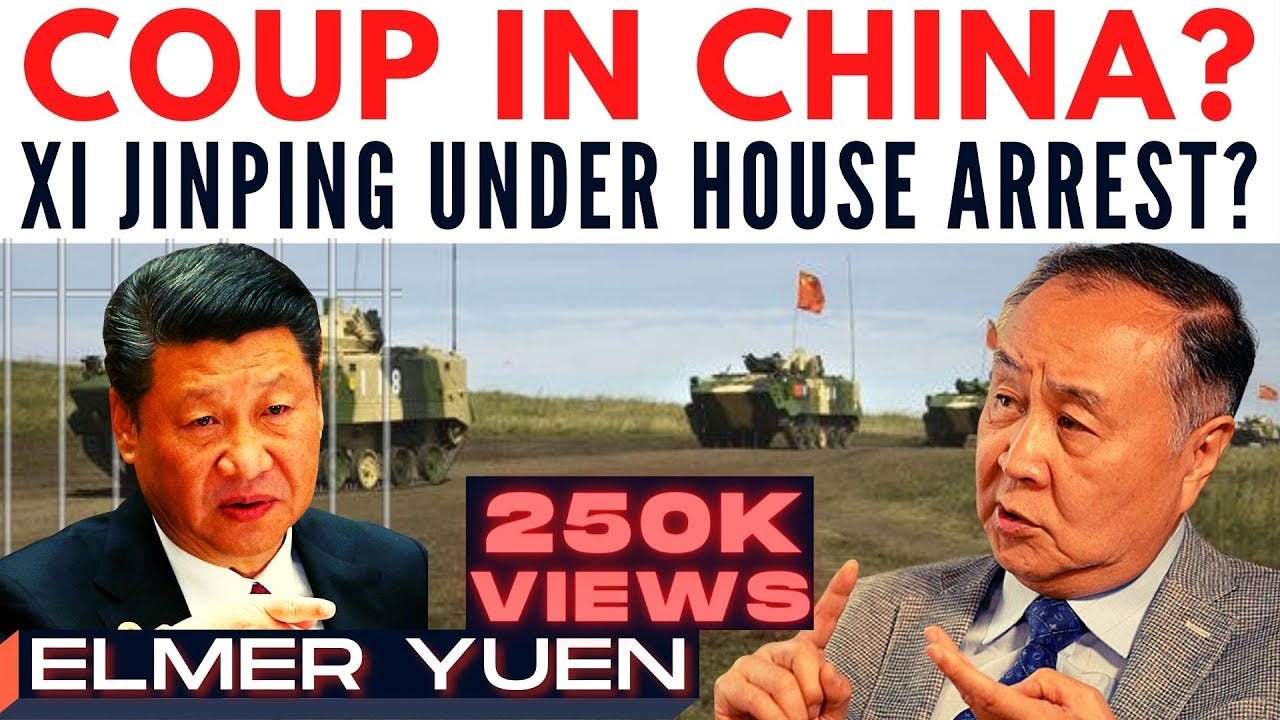
Some highlights from our discussion:
There is a lot of disinformation about China. Specific to the recent rumours of a coup, this seems to have been promulgated by people linked to the Falun Gong, an organisation proscribed by Beijing.
China is also responsible for spreading its own disinformation, for example about the supposed US-origins of COVID. Much of this is aimed at Chinese nationals abroad.
Control of information is vital for the Communist Party, especially in the run up to important events like this autumn’s Congress.
You can also listen to the podcast on Apple, Amazon, or Spotify.
As always please do share, comment, and subscribe. We’ll be back next week with more What China Wants.
Many thanks for listening.
***
Here is the transcript:
Sam Olsen: Hello, and welcome back to What China Wants with me, Sam Olsen, and Stewart Paterson, as always. Now, many of you will have seen this last weekend, lots of news buzz about an apparent coup against Xi Jinping in China. My phone was certainly taking a lot of incoming messages and emails from people wondering whether this was happening or not, and I'm sure yours was too Stewart. But it didn't take very much digging to realise there was hardly any proper news associated with these rumours. So for all intents and purposes, that's all they were, rumours.
But it did start Stewart and I thinking, to what degree is disinformation playing a big part of China's campaigns abroad, but also with China's relationship with its own people. And to that extent, we thought that it would be very useful to bring in a definite friend of the show, Alex Neill. He has been studying the use of information with regard to China for many years, and to ask him what he thinks about the latest news, or rumours I should say, about Xi Jinping's coup, but also the general attitude to information and disinformation from China. So without further ado, welcome, Alex.
Alex Neill: Thanks very much, Sam. Great to be back and greetings Stewart.
Stewart Paterson: Well, thank you, Alex. Maybe we should just kick off with a black and white question, although nothing's ever quite black and white with regards to China. Clearly, Alex, there has been no coup by any stretch of the definition. Is that correct?
AN: I think that it is a very safe bet to say there has been no coup.
SP: And in fact, looking at some of the activity in China over the last few day, one could argue that if anything, Xi Jinping has been very active in solidifying his position. I'm referring here to a number of recent imprisonments that have taken place. Although the charges that have levied against these individuals are serious ones to do with corruption and other crimes of that nature, there is inevitably a suspicion that politics has played a part in them.
So for example, Sun Lijun, who is a former Vice Minister of Public Security has received a death sentence, which is likely to be commuted to life imprisonment without parole after two years. Fu Zhenghua, the former Justice Minister, has also been imprisoned on charges of accepting bribes, and Liu Xinyun, who is former vice governor and Head of Public Security in Shanxi province, was sentenced to 14 years and also Gong Daoan, a former Deputy Mayor of Shanghai, has also received a life prison sentence for accepting bribes.
So the anti-corruption campaign - if one wants to call it that - seems to be ongoing. And, Alex, in your view, is there anything that you're seeing coming out of China that suggests that Xi Jinping's situation is in any way precarious? Or should we read these events as being indications of the solidity of his position?
AN: No, I don't think there's anything to indicate that Xi Jinping's situation has become precarious in any way. If anything, these are cases which will set an example on the run up to the 20th Party Congress, a selection of corrupt characters who have been subjected to the same internal party process of investigation and who are now in public being vilified and there will be a process of them. Well, first of all, they were stripped from their party positions, and now they have been sentenced. But I think this is a signal that, with expectation that Xi Jinping will be moving into a third term - that seems to be the received wisdom - at the 20th Party Congress in a couple of weeks’ time, that initiative of continuing to target both the 'tigers' and the 'flies' as part of his corruption campaign will be ongoing.
But if you drill into it, I would not dismiss speculation that the sentencing of some of these individuals may be linked to last minute jockeying or horse-trading or factional rivalries or betrayals. It could be that, but we simply don't know. I think all we can say is that Party resilience and the integrity of the Party and Xi's determination to continue the anti-corruption campaign is ongoing and it is sort of a demonstration of business as normal, if you like.
SP: So Alex, one of the issues that this all raises is, how can it be the case that in a country as large and as important as China, these rumours, which are disinformation effectively, can spread so rapidly? I mean, why is there so much disinformation around China?
AN: Well, I think we need to consider the Great Firewall. We are all talking about disinformation promulgating and propagating and accelerating around the world, around social media. But I think we need to consider that none of this really is probably surfacing inside China itself. This is something that has been flying around Western social media platforms, and around Western networks.
Inside China, I think that the picture is likely to be very different. The censorship system in China is basically operated by artificial intelligence now, it's almost automated. And of course, there will be challenges or discussion about the outcomes of the 20th Party Congress. But this will all be in veiled language. It will be in cryptic language designed to defeat the artificial intelligence and the automated censorship mechanisms that the Great Firewall operates or at least domestically within China.
But externally, what has been allowed to happen is the dissident movement, particularly the Falun Gong, has transmitted a stream of disinformation which has become a meme and has accelerated around the globe, and has created almost a hysteria if you like about rumours of a coup taking place and all kinds of outlandish ideas about what might have happened to Xi Jinping.
The Falun Gong movement is ostensibly founded in some rather quirky Buddhist theory. I think in some interpretations, it could be regarded as a cult movement. But what is interesting is 20-odd years ago, the Communist Party realised that the Falun Gong had infiltrated society, not just in a populist way, but it had also permeated the ranks of the Communist Party. And eventually, there was a sit-in protest around the Zhongnanhai compound, of Falun Gong practitioners. This hugely unnerved the Chinese leadership at the time, and therein commenced a campaign of really quite vicious prosecution of this organisation. I suppose the interesting thing about it is that it has endured. There are funders and outposts of the Falun Gong outside of China, the organisation has endured, and it has created media outlets such as the Epoch Times, for example.
This disinformation campaign is one example of how they are trying to get back at the Chinese leadership. I think it's been quite interesting, the ability to mount disinformation campaigns outside of China's borders, but internally, I don't think it's really had an impact.

SO: So Alex, this is a very interesting point you raise about the Falun Gong. And, you and I were speaking before this, and there is certainly a suggestion that people within Falun Gong, who are obviously notable domestic opponents of Xi Jinping and the Communist Party, that this organisation has been instrumental, as far as your research goes, in helping to promulgate the rumours of the coup.
One of the other things I think it is important to discuss is the way that people that wanted to believe there was a coup were so readily involved in spreading that disinformation. For example, it has been suggested in some of the sources I've read online, that a lot of the people pushing the coup headline were based in India. Of course, Indian nationalists have been having a bit of a to-do with Chinese Nationalists over the last few years, specifically around the border issues which has led to the deaths of quite a few on both sides a few years ago.
What is your view, Alex? I mean, is this something, the coup, is it part of a wider programme of people opposed to China trying to create disinformation around Chinese hierarchies, specifically around the stability of Xi Jinping? Or do you think this is a one off?
AN: Well, I think you're right, Sam, it is a really important juncture in Chinese politics. This is a 10 year cycle we are watching, and movements like the Falun Gong, they have got a huge amount of anxiety which stems from almost 20 years ago when the organisation was persecuted by Chinese authorities, and that persecution has been relentless. After the Falun Gong, became a proscribed organisation in China, they developed a very well-constructed and well-organised organisation outside of China, well-funded as well, including media organisations and key exiled figures. The Falun Gong movement clearly wants to exploit this time of political change in China to highlight their own plight, but also some of the injustices and well, you could call it pretty draconian measures, used against their organisation over the last two decades.
SP: Sam, we have talked a little bit there about disinformation about China. But China itself obviously has been at the forefront of a number of disinformation campaigns aimed at us hasn't it, in the recent past? Perhaps you would like to elaborate on some of those? Because it seems to me that we are in this information war or disinformation war, where narratives are being created with pernicious ends in sight.
SO: Yes, Stewart, you are completely right. Although there will be people, obviously, that say that China really is not doing much in the disinformation base, it is quite clear to most that there has been an awful lot of work done by Chinese authorities, specifically in thinking around COVID. If you remember, just shortly after the COVID pandemic became a real thing in the West. There were already rumours coming out from China suggesting that it was US servicemen who had brought the virus wittingly or unwittingly from America, to handle it as part of some exercise, when it was quite clear that the origin was far more likely to be in China.
But what is interesting is that I don't know if you saw it in the Sunday Times a few days ago, but Dominic Lawson, the columnist was talking about an American professor called Jeffrey Sachs, who has been quite instrumental in working out the origins of COVID. And it's quite clear that he is someone that feels very strongly affiliated with the Communist Party, at least in terms of its messaging, because he's been quite clear in saying that the COVID virus originated in America and is America's fault, and America is trying to deflect the blame. And in fact, Jeffrey Sachs was part of, or in fact, I think, Chairman of a commission put together by the Lancet magazine, the preeminent medical magazine, looking at the COVID origin. He was quoted saying "the origin of the virus remains unknown". So that is better than saying specifically around America, but I think it is still quite disingenuous to say that we don't really know much about the origins of the virus when China is presumed by almost every single intelligence official that I have spoken to, to be the origin. That doesn't mean that it was specifically released by China, that's probably very doubtful, but it could have been quite easily an accident or something like that.
Nonetheless, the fact that China has done very well in convincing, as Dominic Lawson calls them 'useful idiots' in the West to promulgate the China line on this, it's been quite a success for them. Alex, a lot of your career has been spent looking at the way that China uses information and uses its agents on the ground around the world to spread information. How successful do you think China has been in in the COVID origin story, in trying to get the world to believe its side rather than sort of admitting any mistake it has made?
AN: Well, the Fort Detrick disinformation campaign, I think, has largely been unsuccessful. You will have a whole range of agitators across the world who may have sympathies with China or may have antipathy towards some kind of Western conspiracy in the post-Cold War world. But the notion that a virus was brought in from Fort Detrick, where allegedly virological experimentation was taking place.. it's become quite farcical, to be honest.
But it's still there in Chinese propaganda. If you look at Chinese newspapers, there are cartoons depicting fort Detrick leaking out microbes and being carried over to the Wuhan games which happened I think, in October, prior to the Wuhan outbreak. Clearly that storyline came out of China's propaganda machine in the wake of accusations of leaks from a PLA laboratory in Wuhan, or at least a military-backed biological warfare centre. There is some pretty blunt and shoddy propaganda machinery operating. But yes, there are individuals and societies around the world that are prepared to swallow that.
What we really need is empirical data, and as we have seen from the UN delegation that visited Wuhan and described obfuscation and concealment and all of the frustrations around that, I think we need to wait for empirical data about the provenance of the virus.
SO: Do you think that's likely? I don't think anyone in the West is holding their breath of empirical evidence coming out from China.
AN: No, it's not going to happen, I think. But to answer your original question about China's disinformation campaigns, China has become quite adroit at using social media platforms within the Chinese language speaking community around the world. Some of this is funded by the United Front Work Department, and its fronts around the world. That has gained traction. In parts of Southeast Asia and other areas where overseas Chinese communities or ethnic Chinese communities are concentrated, you will find more traction with the Chinese narrative. I think that is where disinformation and the question of the use of influence and whether or not that develops on to interference, that's a really important question. So things like COVID diplomacy, agitation propaganda, which the Chinese Communist Party is able to do, they all come into play.
SO: So you might have seen that the Centre for European Policy Analysis produced a report, I think last year, talking about how Russia and China have started to combine their disinformation or information campaigns from their point of view around the world. And so going back to what Alex was saying, looking at specific communities, it's not just the Chinese community around the world, though, it's sort of anyone that can sort of be used to stir up issues within Western societies have been reached.
But this is notable that since that report was published in December, obviously, we've had the war in Ukraine. And in the recent months, you have seen Chinese officials, and a lot on Chinese social media, amplifying Russian claims about, for example, US bioweapons being in Ukraine, and in many of the denials made by Russia, about any war crimes, etc. So I suppose the question is, to what degree are Russia and China now in a tangible information partnership, is it Russia and China versus the West online, as well now?
AN: I think, you know, what we have seen in the in the recent Shanghai Cooperation Organisation meetings and engagement between Russia and China, Li Zhanshu, the number three on the Standing Committee, the current Standing Committee, he expressed synergy, if you like on the position of Ukraine and Russia. He basically said that China was with Russia on this. The narrative coming from China is very much that NATO, particularly America, fomented the conditions for the outbreak of war in Ukraine.
And the narrative is, is that Russia has been targeted by the United States and NATO through the vector of Ukraine, and that China is next. That is definitely a narrative which has been propagated within the Chinese leadership, and we heard that from Li Zhanshu. But if you read it, in journals or on People's Daily, the narrative is very much that the war in Ukraine is viewed as a proxy war for the West in its rivalry with Russia to take Russia down, and that China could be next, and that the link between US and allied activities in the Indo Pacific is similar to what is going on in Ukraine.

SP: Alex, can you perhaps just give our audience some sort of indication as to how the domestic Chinese population living behind the Great Firewall access alternative viewpoints. To what extent is that actually possible? And is there any way to judge the extent to which the official Party line is actually swallowed and believed by the public at large in China?
AN: I think the educated classes in China, the elites, they will all have access to VPN technologies one way or another. VPN technologies, of course, they are illegal, so there is a risk of being detected and facing prosecution by the Chinese authorities. But I think it's fair to say that Chinese middle-class society and the elites as well, if they want to get an alternative view, if they want to understand Western perspectives, they can do that.
The other question I would raise is there is a very significant expat population, if you want to call that economic migrants, wealthy Chinese, middle class Chinese around the world, who are residing in places where there is free media, and they will be watching Western news feeds, and looking at Western social media, and seeing the realities of what's going on. I don't think we can dismiss that.
Privately, I think Chinese society and its interaction within China and without, is a really important factor. So I don't think we can say that there is this sort of bifurcated world where China behind the Great Firewall is a sort of naive, isolated society, and China without is somehow exposed to this broader narrative. I think it is more complicated than that. But also playing into this is simple Chinese nationalism, and pride in China and anxiety about pressures that the West is exerting on China, and, of course, things like Taiwan, come into play as well on that front.
SO: So just bringing us back to where we were at the beginning of the podcast. In terms of the Party Congress, there's no way, no cat in hell's chance, that China is going to relax any of its information controls internally over the next few weeks as the Party Congress ramps up, right. But what sort of information or controlled communication messaging do you think we are going to see ahead of the Party Congress around the world, Alex?
AN: Well, I think Chinese embassies and missions and organisations around the world will have certainly been unnerved by what appears to be a Falun Gong initiated disinformation campaign, which has been propagated and become a meme. They will be concerned about that, and they will have been alerted by central authorities to be aware of other possible disinformation campaigns, which may accelerate on the approach to October 16th [the date of the Party Congress].
But we are going to see an ever more tightening grip on information flows within China and the state media outside of China. And also, I think, certainly, the Chinese community abroad, will be under more scrutiny from Chinese embassies abroad, to make sure that they fall in-line with their patriotic duties, but also the wishes of the Party over the next couple of weeks.
SP: Alex, thank you very much indeed for your insights into the information war that is obviously an ongoing part of great power rivalry. And we look forward to interviewing you again shortly, particularly I think probably Sam, the best time for that would be after the Congress in mid-October.
SO: I hope you're going to be taking lots of notes, Alex.
AN: Yes, I will be. I will be watching it intently. But thank you very much to both for hosting me again. I think a sort of wash up session within a few weeks after the Party Congress would be fascinating to discuss and I look forward to speaking to your audience again.
SO: Great. Well, thanks, Alex. And we will be back next week with more What China Wants, goodbye.






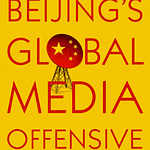
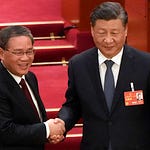
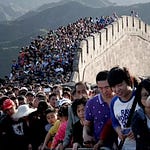



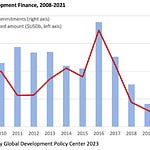
Share this post